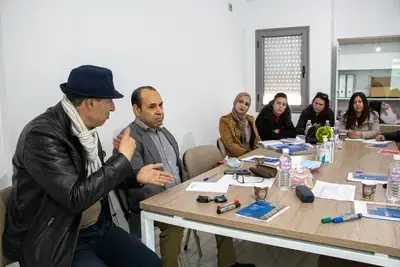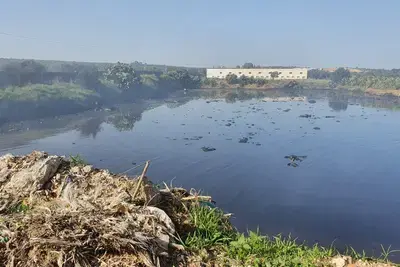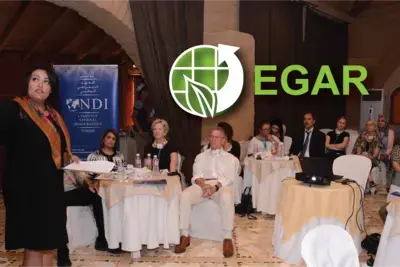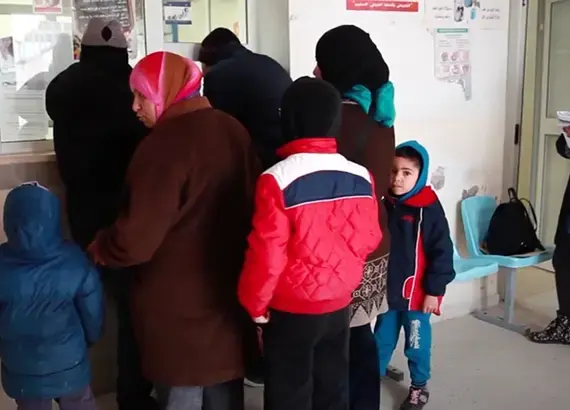
Success Story
Data-driven Responses to COVID-19: Tunisian CSO offers healthcare experience to inform policy
In the face of the spread of COVID-19 in Tunisia, one of NDI’s longstanding citizen election observation partners, Mourakiboun, is stepping up to make its data available to decision-makers and encouraging local CSOs to start evidence-based preventative initiatives in their communities. Comprehensive and accurate data can make all the difference during a public health crisis, allowing for policy-makers to act swiftly to create evidence-based, localized decisions to keep citizens safe. In Tunisia, where the national government does not have this information readily available, civil society contributions are indispensable, informing government responses by painting a picture of available resources in communities across the country. As the situation of COVID-19 in Tunisia develops, Mourakiboun’s contributions will help to ensure that government responses are well-calibrated to local situations.
From 2016-2018, Mourakiboun conducted a Primary Health Care (PHC) Monitoring Initiative with support from NDI that serves as the basis for their involvement in the COVID-19 health crisis today. Under this program, Mourakiboun utilized its expertise in sample-based observation methodology, which the organization primarily uses to monitor election results, to observe and gather data on primary health centers and schools in Tunisia. Mourakiboun’s observers gathered data from a representative sample of PHCs in order to assess the quality of healthcare centers and provide data to decision-makers to improve the quality of frontline health care nationwide. Since 2018, these findings have been utilized by health sector professionals, including representatives from the Ministry of Health (MoH), and have shaped debates about the public health sector in Tunisia. The Chief Inspector of the MoH shared that her department uses Mourakiboun’s list of PHCs to identify which sites should receive the government’s technical support.
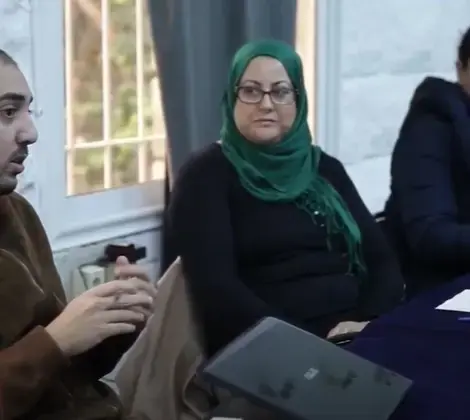
As a result of this initiative, Mourakiboun maintains up-to-date maps of PHCs and schools across the country. Realizing that the data, if made publicly available, could be useful in the COVID response effort, Mourakiboun posted an invitation on its Facebook page for any interested parties to contact the organization to receive the mapping data. In April, Mourakiboun’s president appeared on national television to discuss the organization's work in the health sector and invited stakeholders to request and use their data as needed. Their data set includes recommendations on providing medication to the elderly, sanitizing public spaces, and enforcing social distance parameters in public gatherings, a highly valuable resource while stakeholders assess their use of health infrastructure in COVID-19 response efforts. This is particularly useful for remote and rural zones, where prior to Mourakiboun’s efforts, resources were not well-mapped. So far, the data has been shared with a variety of stakeholders including the Tunisian Ministry of Human Rights, as well as with various international and national civil society organizations focusing on general public health, children’s issues, and women’s health, among others The data will thus impact how response initiatives are designed and rolled out across a wide variety of actors working to combat COVID-19 in Tunisia. Importantly, the Ministry of Human Rights has used Mourakiboun map data, in this instance of schools, to organize an online donation platform, connecting users with nearby schools who are accepting donations to provide relief. Someone wishing to make a donation simply inserts their location, and the system accesses Mourakiboun’s data to find the closest school that is accepting donations.
Mourakiboun’s PHC work is being used by the Sehaty (“My Health”) consortium, a group of national and international organizations interested in improving health outcomes in Tunisia. Led by Médecins du Monde Belgique and supported by the EU, the Sehaty consortium uses Mourakiboun’s data to inform their efforts to improve citizens’ access to primary health care. In early April, this consortium issued a call for proposals from local CSOs that will contribute to improving the government’s short-term response to the virus. Specifically, they are looking for programs that contribute to improving access and quality of health services, community mobilization, prevention and health promotion. Mourakiboun has also signed a petition drafted by Tunisian CSOs to “Save the Public Health Sector” in Tunisia, which advocates for a more holistic response to the pandemic that decentralizes the health care system, in contrast to current policies.
While ongoing, it is clear that Mourakiboun’s contribution to COVID-19 response in Tunisia will greatly enhance the government’s ability to respond to the particular needs of communities around the country. In times of crisis, the need for evidence-based policy is stronger than ever, and by making key data available to decision-makers and reentering the public health sector, Mourakiboun has offered a great resource to Tunisian officials, informing key conversations on policy responses to the crisis. NDI hopes to continue to support partners as they pursue this type of innovative application of their experiences, both during the COVID-19 crisis, and beyond.
NDI's engagement with Mourakiboun's health sector and election observation projects was implemented with support from the United States Department of State's Bureau of Near Eastern Affairs and the United States Agency for International Development, respectively.
